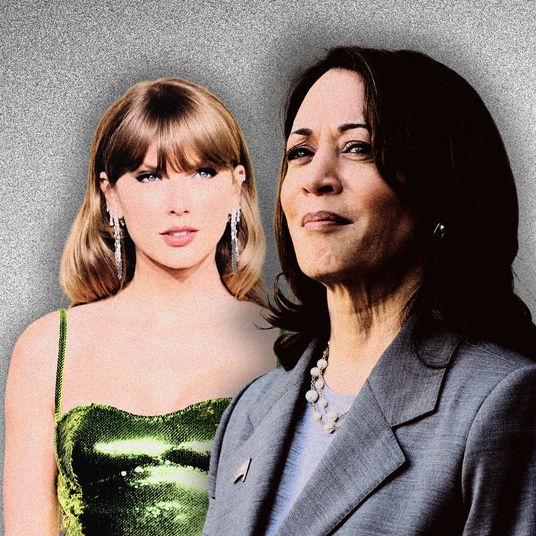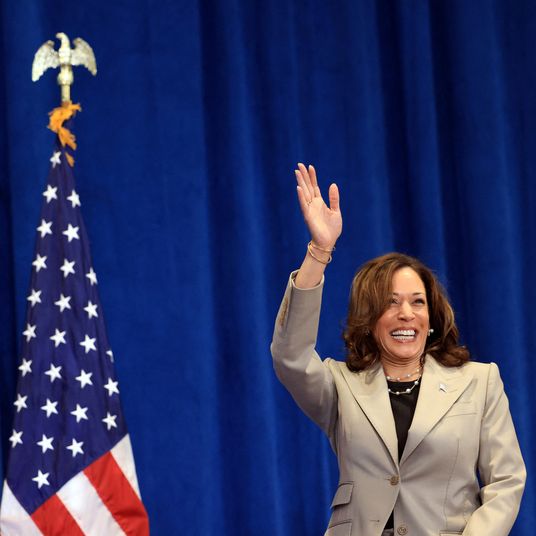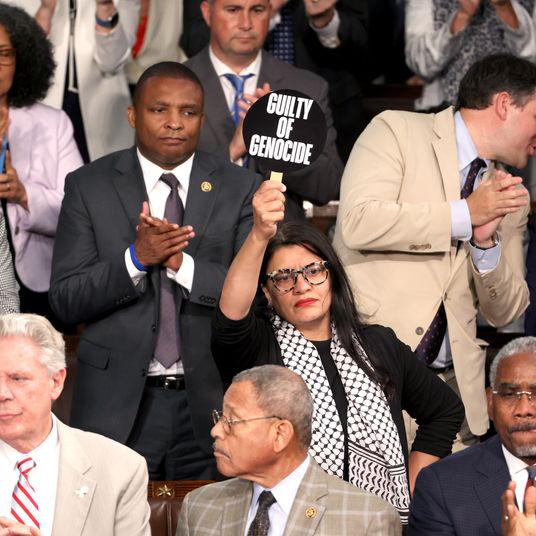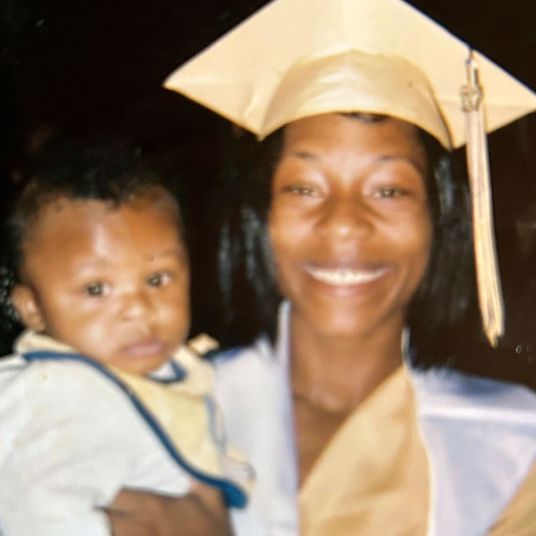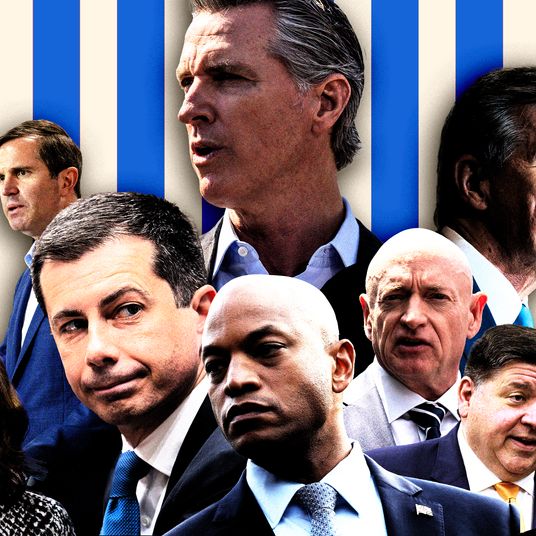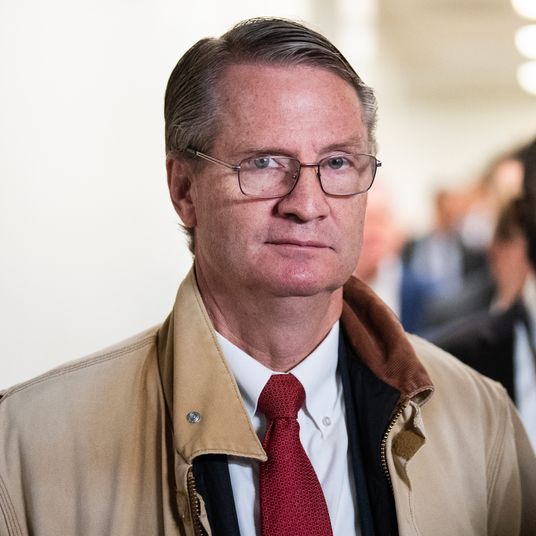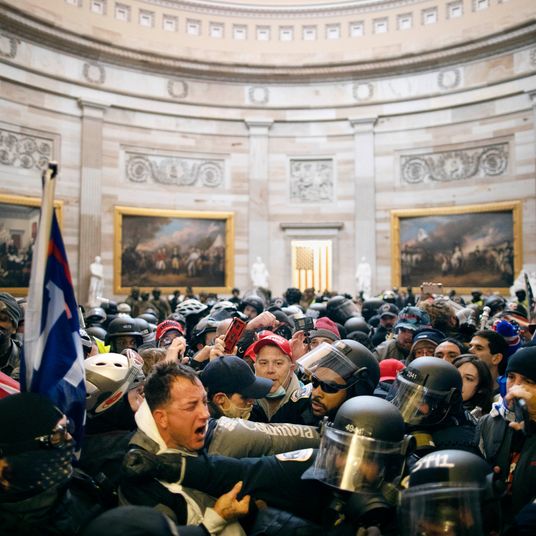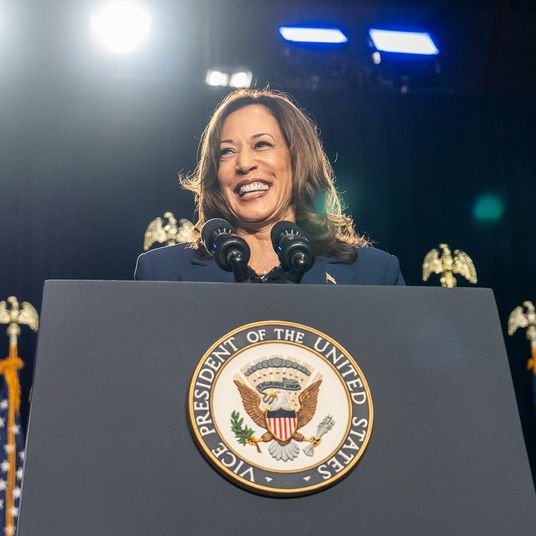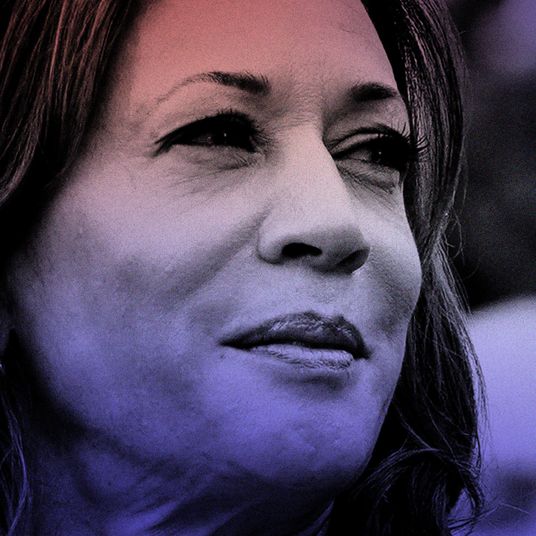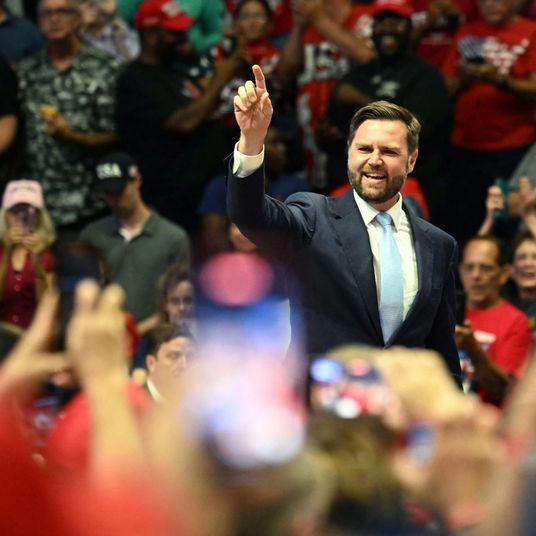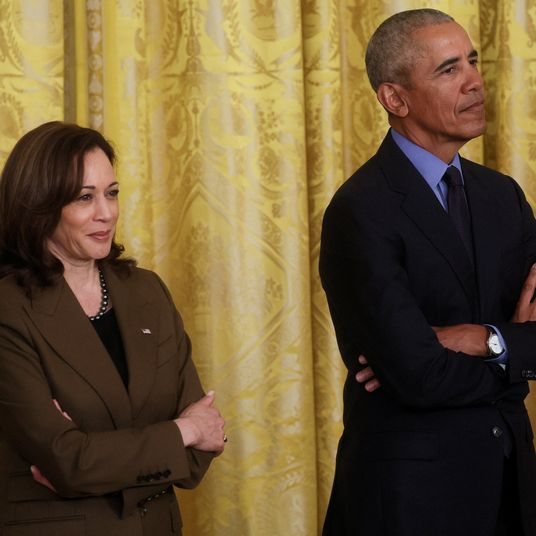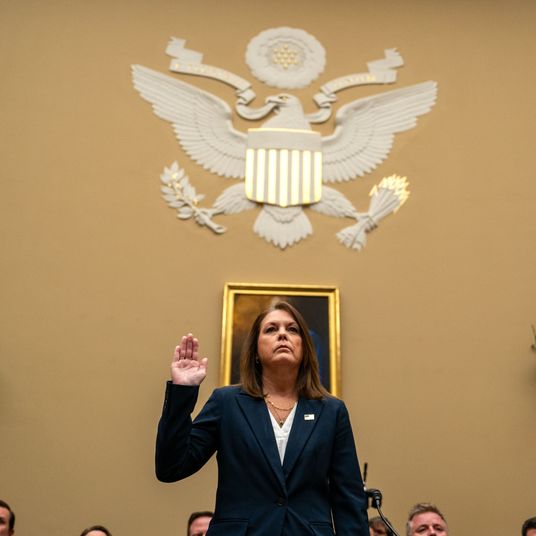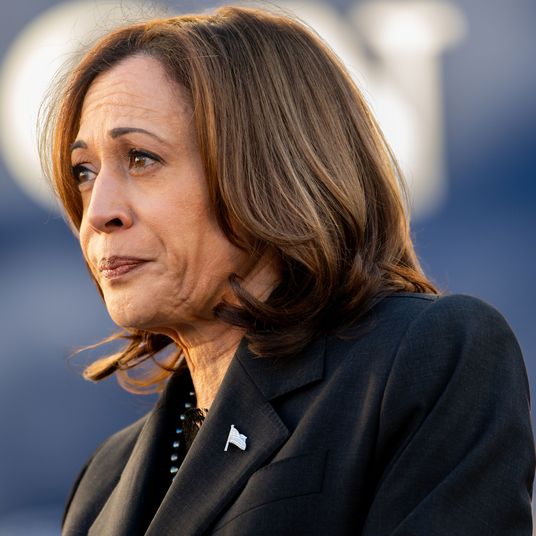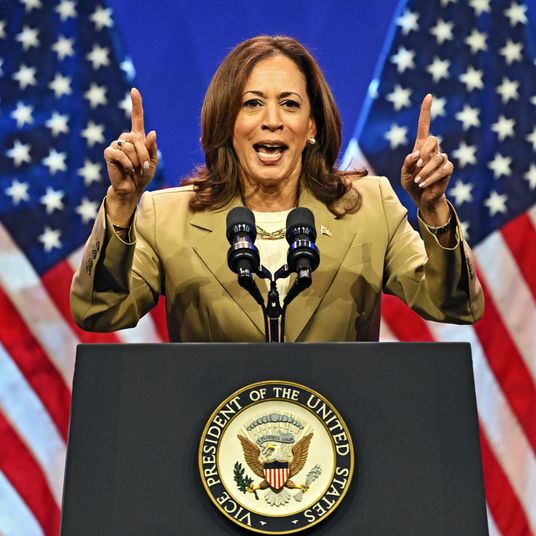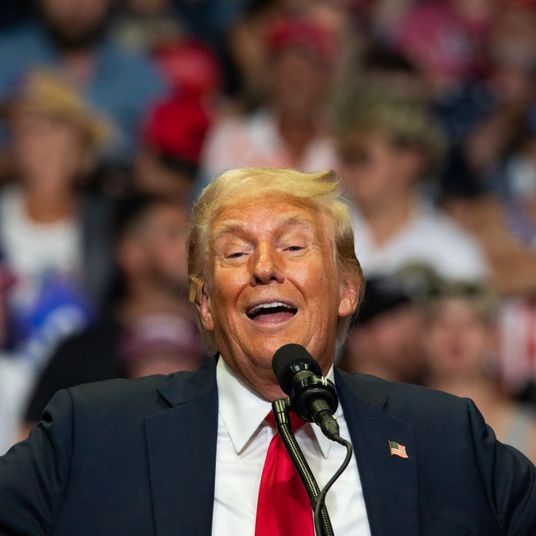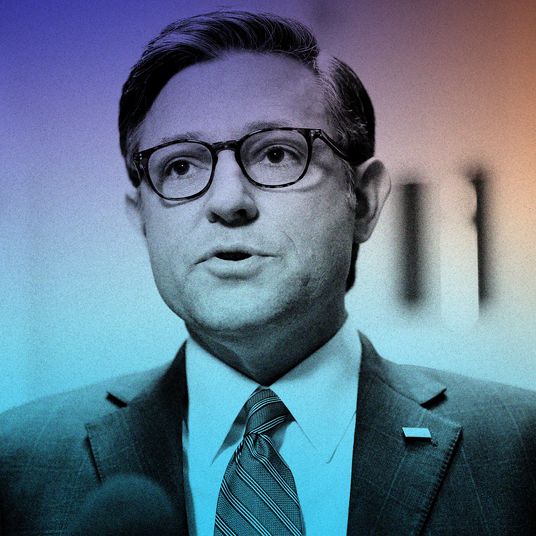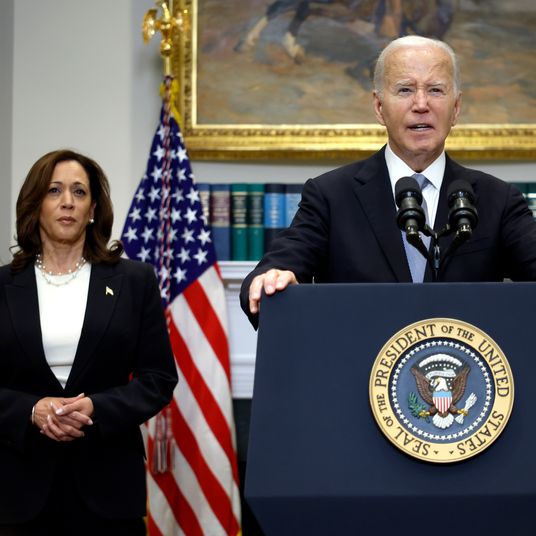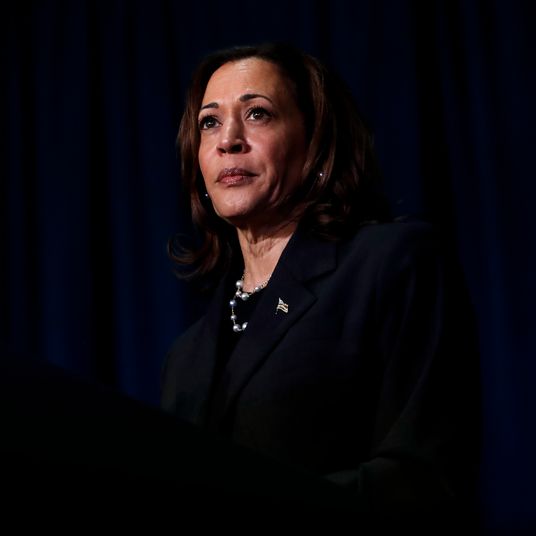
Is Joe Biden toast? Should he be? Should someone his age even be running for reelection? The president has not been faring well in recent polls. The newest one, released Sunday morning, was a Washington Post–ABC News “outlier” poll showing Donald Trump leading Biden in their prospective 2024 rematch by a significant margin. That came after an outpouring of Biden angst in op-eds, including calls for him to bow out of the race entirely. Does any of it really matter, though? More than a year before Election Day?
Last week, for the latest episode of On With Kara Swisher, Kara hosted an all-star panel to discuss the seeming doom loop about Biden’s political future. Her in-the-know guests were Franklin Foer, the Atlantic writer whose new book, The Last Politician, offers an inside look at the first two years of the Biden administration; Jen Psaki, who served as Biden’s first White House press secretary before leaving the White House and launching an MSNBC show; Astead Herndon, national political reporter for the New York Times and the host of The Run-Up podcast; and Axios national political correspondent Alex Thompson. The panelists shared their expertise on what’s really going on in the polls, inside the Oval Office, and out on the campaign trail. They also weighed in on Trump’s chances, Kamala Harris’s troubles, and whether Taylor Swift should run in 2028. Below is a lightly edited and condensed transcript of their conversation — which was definitely not recorded at a Georgetown dinner party.

On With Kara Swisher
Subscribe on:
.
Is Biden actually on the ropes?
Kara Swisher: Is this in-trouble narrative a panic phase that will pass, that the media tends to indulge in, or is it here to stay? Astead, why don’t you go first.
Astead Herndon: I think it’s real and I think it’s overdue. I think Democrats were overly, I think the narrative was overly confident at the beginning of the year and post-midterms, and underrated how close this type of election would be. And I think people are coming down to earth to say like, whoever the Republican is, even if it’s Donald Trump, can very much win.
Franklin Foer: It’s a moment of pundit wish-casting where there’s this desire to change the horse race on some level, but the age issue that Biden has is obviously deeply implanted in voters’ minds. And that’s the thing that’s causing the panic and his White House; his campaign needs to find some way to address it so that they can mitigate it.
Alex Thompson: Yeah, I don’t think the panic mode is going anywhere. I think we’re going to be seeing this, but I would say that I don’t think Joe Biden is going anywhere. Because Joe Biden, in his mind, the idea that he would be sitting on Election Night and Donald Trump wins. And he didn’t run. I think, he can’t live with himself if that’s the case. He thinks he’s the most electable Democrat out there. He thinks he has a record of run-on. So I do think this is panic mode, but it’s also wish-casting.
Swisher: Okay. Uh, Jen? You worked, of course, in the administration. Now you have a show.
Jen Psaki: Yeah, I mean, look, everybody’s already said smart things, but I think yes, it’s sticking around. He’s still going to be the oldest person. He’s already the oldest person as president. He will also continue to be the oldest person if he’s reelected. But I also think it’s not the worst thing for Democrats because, there are many Democrats out there who think, how could anyone possibly not beat Donald Trump? And it’s like, well, it’s going to be close. This is going to be close ’til the end. So it’s not the worst thing. I do also agree with what Frank said about this wish-casting, right? This is often what happens in this stage of the primary, which is that there is a wish and a hope for some magical purple unicorn who does not exist. And that’s the stage we’re in. We’re not yet in the contrast stage. That’s the stage they really need to get to. But you’re starting to see some inklings of the contrast — the way that the president pushed back on impeachment a little bit last week — a little bit. I think they’re going to get to it probably by early next year, and we’ll see it kind of a slow roll of it. But that’s when people start to kind of come home historically to, like, “You know what? I wanted a purple unicorn. There’s no purple unicorn. This guy is better than the other guy. It’s a choice.”
.
But does Biden’s age really matter? To whom?
Swisher: Let’s go through what people are citing as being Biden’s perceived weaknesses, starting with concerns about his age. Joe Scarborough recently said that every Democrat he talks privately to says Biden is too old to run. Alex, you cover the administration. What are you hearing?
Thompson: Yeah, I think there’s even concern inside the administration about Joe Biden being president at 86. They don’t think that he’s incapable, but obviously it’s a concern. I also think that inside the White House, they are really trying to figure out how to make these poll numbers shift. And you also see a bit of a risk-averse attitude. This is why you’ve seen, like, you notice that he’s not doing the full steps of Air Force One. They’re basically saying, “Yeah, maybe it looks a little bit embarrassing. You have reporters sort of commenting on it. But that’s much better than having him trip one more time.” You also see him in tennis shoes a little bit more — steps they are taking in order to make sure that he does not have another fall. But what else they can do in order to actually change those numbers in a significant way? We’ve all seen the polling. I don’t think they’ve figured it out yet. I don’t know if anyone has a clear answer on it.
Swisher: Right, so just to be clear, he’s 82 at the outset of the second term; he’ll be 86 when he gets on a helicopter and rides away if he wins.
Thompson: Yes.
Swisher: Franklin, you spent a lot of time writing this book. What are the worries inside the administration, and outside the White House?
Foer: I think that the problem is that his inability to finish a sentence, or the fact that his stories occasionally trail off, is now on a continuum with Trump being a lunatic. And this is in part something that they need to combat. It’s also a media failing as well, that there’s just an inability to talk about the relative problems that these two senior citizens have, which I think are not the same in kind, and they’re being smushed together.
And so, you know, when I think about this question, I think, okay, would I prefer not to have an 86-year-old president? Speaking personally, I would prefer not to have an 86-year-old president. Is his mental acuity currently a problem? No, it’s not. If you gave him the type of mental acuity test that Nikki Haley talks about giving him, he would pass that.
Swisher: I don’t know. Was there an apple involved or the glasses, or woman? Camera.
Psaki: “Man, woman, camera.” I don’t even remember what it was.
Swisher: I wouldn’t pass it.
Psaki: Maybe we’d all fail.
Foer: But if, you know, then there’s this question of physical energy, which is, I think, a different sort of question and it is in part a political question because, you know, the question is, does he have the energy to conduct a full general-election campaign. And I think that’s a very open question.
Herndon: I think that the way that I hear voters talking about this is not kind of similar to the kind of political calculations, right? I think Biden and the campaign are clearly going to make a kind of comparative argument that’s been laid out here, about them versus Donald Trump. But it’s never expressed like that. It’s that he was elected in the sense of an emergency, and they didn’t really think he would last this long. Like, it’s not that complicated. I think it’s a persistent problem, because there’s nothing that putting him out on the trail can do about that. In fact, putting him back on the trail only reminds him of that fact, right?
And so I don’t think necessarily that for the majority of people, at least I talked to, that they think Biden and Trump are the same, right? But it’s that they think that the fact that the political system has produced these results has made them feel disconnected. I hear about not voting. I hear about third party. I hear about … like, we have a record number of people just mentioning other options, without even getting them in polling. It’s not necessarily, to me, that it is expressed in kind of flattening Biden and Trump to the same. More so than it just continues a dissatisfaction with both parties. That’s the thing that I don’t think we know, how that plays out in the next year.
Swisher: That’s a very good point. I want to get to that in a minute, but does it help or hurt that there’s other elderly people struggling in our political universe? You see Dianne Feinstein, Mitch McConnell having his moments — does that affect it, that everyone’s thinking: “Old Congress, and there’s the head of it.”
Herndon: Personally, I think it affects it, yeah. No, I don’t think it’s good for Biden. I don’t think McConnell’s good for Biden, and there’s a D and R distinction. I think the olds are together.
Psaki: It unquestionably hurts. Because there is this feeling that Astead referenced, which is the feeling of: These people are so old. They’re so old and white. They’re disconnected from what we’re experiencing and what we’re living — and all of them are old. And why are all these old people running Washington now? They’re not the same, obviously different health, all the things. We can explain it, but when you’re explaining it, it’s kind of a challenge. So I think it’s unquestionably bad.
I also thought that what you said was interesting. The conversations happening out in the country — I look at polling, I go out travel with people, I’ve been on campaigns, whatever — are so different from the David Ignatius column about Biden.
Biden, and the Biden and Harris team in the White House, has challenges about running for running for reelection, unquestionably. We’re talking about them. That is not the conversation happening in the country. That is a conversation, outlined in that op-ed, that is happening at dinner parties in Washington and maybe some other coastal cities. Those are also important people …
Swisher: Elites. Georgetown dinner parties.
Psaki: Yes, but my point is, are those important people? Sure. But like, it is not a definition of what the challenges are. There are different challenges, in my view, and when you were talking it just made me think of that.
Swisher: You know, it’s interesting because one of the things, it read like to me, was “it had to be said.” But I was like, but people are saying it already but okay — but it’s a who-said-it kind of thing. Do you think that’s fair, Astead?
Herndon: Well, it’s been funny to me because, you know, you go to the campaign and you ask about age and they act like you crossed this crazy boundary that — like, How dare you ask about this man’s age? And you talk to someone, a regular person … I was like, five, six days in the Iowa State Fair — and it’s every single second, right? It’s all the time. And so the taboo around talking about his age is really a White House Washington–driven thing that has created a political insulation that is helpful for Biden. So, I get it, you know, I get why they’re doing it. But the idea that it is somehow not a thing to talk about is really, really out of whack. In fact, it is the foremost thing.
Even at the beginning of the year, from the midterms to now, I would get asked all the time about what the other options are going to be for Democrats. And I’m like, “No, it’s going to be Joe Biden. He’s going to run again and he’s going to be the nominee.” And people would be shocked. And you see this in polling over that: People were consistently saying they want another option, completely consistently saying they wanted other things. I don’t know if that actually is true, right? When you put people’s names to it, it definitely collapses, more so than the figment of the imagination. But the reality is that the assumption that he would be on this coronation to the next reelection was very much, much more a Beltway thing than ever translated outside.
Swisher: Very fair point. Okay, we’re going to get to voter sentiment in a moment, but let’s talk about, empirically, what’s going on in his ability to do the job. I’m going to start with you, Franklin. There’s a critique that this is a staff-run administration. Republicans want to make the argument that the president is absent or a figurehead. Um, you’ve got a couple of years reporting inside the administration in your book. What do you make of those claims?
Foer: I’d say it’s kind of the opposite — in a way that I think most people are surprised by, but Jen Psaki probably won’t be — that he’s somebody who is surrounded by a group of people, most of whom are in the innermost layer are people who’ve been with him, some of them since the 1980s, when they were very young. Staffers working for him. And that dynamic is still very much in play. It’s like it’s kind of this familial structure around him where everybody is very accustomed to the way that Joe Biden thinks, the types of questions that he asks. I would say that more than being staff-run, when the most powerful people in his staff tend to object to something that he wants to do, they almost universally get overruled.
And then there are lots of examples of the ways in which, when confronted with Problem A, his tendency is not to delegate, it’s to throw himself into it. So whether it’s something like the baby-formula shortage and he’s like tracking pallets coming in from Europe, or the Afghanistan withdrawal where he’s got a map of Kabul out on the desk and is like the one trying to figure out the routes for refugees to get to the airport himself. I think he could probably, would benefit, oftentimes, from being more removed from the details of policy.
Swisher: Fair point. It’s like that SNL skit with Ronald Reagan, if you remember many years ago, where he’s avuncular and then the door closes and he’s a genius. He’s like an evil genius of all kinds.
.
Is there a ‘Biden Coalition’? And does his team know what they are doing?
Swisher: Astead, how do these factors impact voter turnout? Because early this summer on your New York Times podcast, The Run-Up, Julian Castro argued that Democrats might not be as motivated to turn out in ’24, and that was in part because of [Biden’s] age.
Herndon: Yeah, I think that you see that in polling consistently, the ups and downs of Biden in polling have gone from terrible, because Democrats have fallen out, to bad, because they’re somewhat with him, right? That’s really the distinction we’ve seen over the last year and a half. And the last summer, well, that was at his kind of lowest point. I think we’ve seen some bounce back there, but it’s not consistent. I mean, in the other Times polling — Nate Cohn did a great column about this in the last couple of weeks — there are consistent signs of erosion among non-white communities. There are certain consistent signs of erosion among voters under the age of 40. That was true even when he was running, pre-2020, in the primary. Some of this is a party that’s just not reinvigorated what we would, I think, kind of call the Obama coalition of ’08 and ’12, right? The new versions of young people, the younger versions of those people of color and college grads, are not identifying with Democrats in the same way.
And so this hasn’t been disastrous for the party because they’ve made up those gains in other places. But we should be honest. This is a wider Democratic Party. This is a more college-educated Democratic Party. This is not Barack Obama’s Democratic Party. And so I think if there’s an honesty around that, then it makes a lot of sense to me. But if we’re talking about turnout, specifically among those kind of base coalitions, there is real concern about those things over the next year, and there’s real concern in states where that could be a tipping point, right?
So where we’ve seen Democrats, in, say, the Wisconsins, make up a lot of ground in Joe Biden’s time, has not been in the Milwaukees doing something different. It’s been in making up the kind of floor that they had in rural communities, driving out more folks in and around Madison, doing better around the suburbs. And that’s helped them, right? That’s flipped the whole [state] Supreme Court race. So I don’t think that’s a bad thing. I just think it’s a different thing than what … then the communities we have typically associated with driving the Democratic Party’s biggest [turnout].
Swisher: Right. So polling is another weakness, as you noted. Of course — big caveat — this is horse-race politics. How much faith do we put in polls 13 months out? I always think people don’t really know what they think, or it’s nothing’s baked, at least. Alex, you start, and then Franklin and Jen.
Thompson: Yeah, you talk to anyone on the Biden campaign, they’ll very clearly point out that: I believe this was the month when Nate Silver wrote a New York Times Magazine story in 2011 saying, “Is Obama Toast?” It was like that August when there was a jobs report where there were zero jobs created. And they’ll point out that 13 months is too early. That being said, you can, you do see some early urgency from the Biden team. They’re spending $25 million on TV already. Almost all in pro-Biden ads. They’re trying to boost his numbers, to Astead’s point, really, you know, work on that erosion among Democrats. Not necessarily trying to attack Trump. I imagine, there’s been a few of those, and that will come along. I can tell you, though: People that have gone to the White House with their worries about these poll numbers — Mike Donilon, who is sort of like the Biden whisperer and sort of strategist — there’s sort of a confidence that at the end of the day, the combination of Trump being the nominee, abortion rights, and then you sort of at least fight to a draw, if not get an advantage on the economy, that ultimately will lead to a Biden reelection.
Foer: Yeah, they were contrarian about the 2022 election where everybody was saying, “You’ve got to talk about crime. You’ve got to talk about the economy.” And they were pretty resolute about saying, “No, we’re going to stick to our attack on the ultra-MAGA Republicans.” And in the end, their political instincts were right about that, which doesn’t mean that they’re going to be correct about this going forward, but you have the abortion issue. You do have this ultra-MAGA thing. And those are real. I think also the thing that is interesting that Astead was hinting at, which is that this election could have a different dynamic, where we’re used to having Democratic candidates have to run up three- or four-point advantages in the popular vote in order to win the Electoral College, but you’re going to have a lot of erosion. It seems like in places like California and New York, and so the spread in the popular vote could be much narrower, and that doesn’t necessarily turn into an Electoral [College win].
Psaki: You know, no one’s going to re-create the Obama coalition. I worked for him on both campaigns. No one’s been able to re-create it. They need to create their own coalition. This is what they will tell you and this is how they think about it. And part of it is to tap into some of the dynamics that others have mentioned, including the abortion issue. What’s tricky, is the abortion issue, is women are still at risk across the country. But it was so fresh in 2022. It was so on people’s minds. You really have to figure out how to reengage people because one of the challenges they’ve had, we’ve all talked about this, is that there’s voters out there who hate everyone. Like, they’re the double-haters. They hate all the candidates. And how do you turn those out? Some of them are these white working-class, non-college-educated women, right? Biden is not going to win them. But if he can lose them by less, that is a very helpful coalition for him, or group of people. And they are enraged by the abortion issue. That is also a group that helped, in 2022, Democrats, helped Glenn Youngkin for a different reason in 2021. So they’re mindful what their coalition is, and it’s not going to look like Obama’s.
Swisher: You just described my mother. Like, she’s like, “Biden, he’s old. Trump’s an idiot.”
Psaki: Right. So it’s like, fine. So there is some of that. Is that what we want in our political system? No, but here we are. So —
Swisher: I’m still going to slow-roll her to the polling site. Anyway, let’s dive into the nitty-gritty here. Astead, you mentioned Biden is struggling with Black and Latino voters. Biden is roughly 53 percent versus 70 percent in 2020. You’re out talking to these voters. What do you think explains this drop in support except like: Oh, is there another movie here?
Herndon: Yeah, I think we mostly see that erosion happening in the biggest ways among sub-40 Black voters and Latino voters. I think that there is a cross-racial kind of generational split that’s happening here. I mean, some of this stuff is ideological. This was the group that was more into progressive candidates in the 2020 primary who wants more things talked about structurally, I think has a greater dissatisfaction with [the] system. I think, specific to Black communities, there’s increasingly less identification with Democrats as a whole, right? You have less people going to church. You have like less of that kind of consistent through-line between their touch points with the Democratic Party that used to exist in these communities for a long time.
I also think that we should just call it out like, post-Obama, I think Democrats thought they could representation their way to getting all these votes. They thought that if they put the right number of people in the right number of positions, then that means that all these people would vote for them. Nobody told them that was true. That was an idea that they made up, right? And that just hasn’t panned out.
I’m obsessed with the [Democratic Party’s] switch — we did an episode about this — from Iowa to South Carolina, because I frankly think that ended the primary right there. Like, if this primary was still starting in Iowa for Democrats, I think your Dean Phillips of the world, I think your other candidates — who have a lot of a different infrastructure that was built in, in those early states — Biden used the post-midterm moment to really collapse the primary. And I think that that was a really, really important thing that happened at the beginning of the year, almost without any media scrutiny. And so, you know, I think the combo of those things has really set the party into this decision, right? Like it’s locked in the “Rolling with Biden” and whatever pluses and minuses that takes.
Swisher: It’s “Riding with Biden.”
Astead: “Riding.” Yeah. And so I just think that that has a lot of benefits that we should acknowledge, right? I don’t want to be overly pessimistic. Joe Biden might very well cakewalk his way to winning this election again, because Donald Trump is making his way to jail, right? But, there’s a lot of reasons why that is completely disconnected from voter sentiment and I think just fuels that system dissatisfaction [that] I think is the theme for the next, rest of the year.
Swisher: So, Jen, publicly, the White House tells reporters they’re not worried about polls. And then what do they say to you privately, since you’ve been in there?
Psaki: Well, I also was in there, whatever it was, 15, 16 months ago. I mean, I think the age issue, whenever people bring it up, they think it’s like, “They’re not tracking it.” They’re fully tracking it. It’s not that it’s just popped up as an issue in the last six months. Even when I was there, which was 15, 16 months ago, that was the issue. That — I don’t know if you’ve looked at polls where you get kind of bubbles of the numbers that pop — and it popped in ways you wouldn’t expect, right? In ways like … I don’t know if you’ll remember when, at the Easter Egg Roll back in 2022, like the person dressed as the Easter Bunny was kind of trying to stop him from answering questions. That was a staffer. Obviously that popped as an age issue. It wasn’t right. But the point is they’re fully tracking it.
This notion that he should be out there talking about Trump’s legal issues. They find that to be kind of an absurd argument. I agree with them on that, in this moment. And they’re well aware of this issue of the need to excite people. Now what they will also say — which is true and I worked for Obama. Obama, the first Black president, his support among African American voters at this time was like in the 50s or 60s or something like that — I don’t remember the exact number — because of what Astead mentioned, because if you don’t deliver on the totality of what you promised, people feel dissatisfied, especially when they’re the root and the base of how you got elected. And so that’s not new to Biden, but it is a challenge they’re going to have to overcome.
.
How can Biden prove he’s doing well on the economy?
Swisher: Biden is being blamed for economic woes, and that’s the way it goes. But the economy is actually doing well and the administration has achieved a lot. I want to do a lightning round on some of these critiques and assess them. Franklin, let’s start with you.
The pandemic, a big concern among voters seems to be they’re worse off post-pandemic. Is the Biden administration a fair scapegoat for that economic critique from voters?
Foer: No, I think that the Biden administration, one of the political struggles has been its inability to connect with its victories, with voter sentiment. Biden was supposed to be this guy who understood that good politics and good policy were deeply interconnected. It was his frustration with the Obama administration that they didn’t talk enough about what was in the initial stimulus. And there were all these plans that they had for going on the road to pitch these sorts of things. And most of the country, understandably, given the name of the legislation — they don’t know what’s in the “Inflation Reduction Act.” There’s no sense that Biden is responsible for the boom in American manufacturing that’s happened now.
Inflation is lower here than other parts of the world. Yet, none of that really seems to matter. And I’m not sure how much of it is just a messaging problem. Inflation is a special type of economic pain that people feel, all the time, and maybe it just needs to recede a little bit deeper into the memory for them to get any credit for any of the good things that they’ve done on the economy.
Swisher: Astead, strikes — another group that feels worse off are workers and unions. We’re seeing strikes in Hollywood, perhaps even more important to DC, strikes in the auto industry. The UAW went on strike last week. Obviously, the longer it goes, the more the economy will suffer and Biden along with it. How much is this going to hurt Biden, and can he be active in the resolution? Now, Trump just attacked the union in an interview rather vehemently, so that was a gift.
Herndon: Yeah, I think that Biden would see this as actually a place that he can make gains. I mean, Biden, a pro-union president, will feel a closeness to those actual individual leaders. They have long histories. I think he’s shown a good track record of that over the years. I think with this one specifically, you see some Republicans, you know, trying to make a lot of the fact that the union’s fears about the electric-vehicle transition should be a way to wedge this against Democrats. The problem is Donald Trump isn’t the one making that argument. I don’t exactly know where the kind of politics fall on there, but I imagine that, you know, Democrats want chances to stand with workers and will seek those out. And I think we’ve seen different signs that union membership, kind of across the country and the increasing workers’ push around that stuff has benefited Democrats in some areas. But I think the specifics of how long and what issues become big in Detroit and Michigan will matter … too much to know right now.
Swisher: Yeah, you’ve seen Whitmer really tighten herself with the workers, which was interesting. And a bunch of very clever ads [from her]. She’s a rather clever politician. The administration has achieved a lot and the economy is doing quite well. Inflation down. Employment numbers are great. Threat of recession continues to recede. Biden isn’t getting credit for it. Why do three out of four voters say inflation is headed in the wrong direction, Jen? And why do voters trust Trump over Biden on the economy by 11 points? Seems like a narrative problem. How do you fix that?
Psaki: I mean, I think they wish they knew, right? And this has been a problem, again, back to when I was there — about him getting credit or not credit for economic accomplishments. Look, there’s a range of issues at play, including the fact that it’s hard to break through with any of this. This is not to blame the media. It’s a reality of what the biggest stories are. So even though he’s out there doing stuff in local communities, it’s just not on the front pages or the headlines or leading the evening news. It’s not, because there’s bigger things happening, or bigger things with news value happening. That’s a challenge for them. This is why I mentioned the paid media, because that’s how they’re going to have to do it on the economy. They don’t have to win by 20 points on the economy. They just have to call it a draw plus. Right? And have people feel like there’s a baseline of — and it’s not just about accomplishments, it’s about “Are you fighting for me?” It’s how voters feel and that is what I think they’re trying to tap into
Swisher: Why do you think they trust Trump then over Biden?
Psaki: Why? I have no earthly clue, honestly.
Swisher: Anybody else have one?
Psaki: Yeah, what do you guys think?
Thompson: I mean, I would say like pre-COVID, Trump was getting pretty high marks on the economy. Now some of that was because of, you know, huge deficits and tax cuts that were sort of fueling that growth. But I think if you go to February 2020, he was getting really high marks and unemployment was really, really low.
Psaki: Yeah, that makes sense.
.
Can Hunter sink Biden?
Swisher: One final alleged weakness that Republicans can’t stop talking about: Hunter Biden. The president’s son has been indicted on gun charges, he just sued the IRS for allegedly leaking his information. So far, voters don’t seem to care that much. Will the president be held responsible for the sins of his son, Alex?
Thompson: This is just such a fascinating dynamic, because if you know anything about Joe Biden, you have to understand that the relationship with Hunter is that Hunter is the only living person from that accident in 1972 that killed his wife and his daughter. And then obviously his son Beau, who was also in the car, died in 2015. So, you have to understand that Joe Biden is clinging to his son, and wakes up every day scared that his son’s going to relapse. And that’s why, when the White House — and I’m sure Jen had to do this dance behind the podium — how do you do the politically right thing, but in a way that is not going to affect Hunter in a negative way? And it is not an enviable position, especially now that Hunter has changed his counsel from someone that was sort of blessed by the White House to the very combative Abbe Lowell, which is why he’s suing the IRS and suing other people. And that means that Hunter’s going to be in the headlines more. But, you know, Hunter was always sort of more pugnacious, of the two brothers. And I think after two years of having your father’s political enemies mine the worst moments of your life to humiliate you — I think this is going to be a really interesting thing for the next 16 months, because I don’t think it’s going away.
Swisher: Would anybody else have a different take? Franklin?
Foer: No, I think the danger is again that this just muddies things in voters’ minds, that part of what we were talking about gerontocracy earlier, is the way in which everybody kind of gets lumped together in this blob of power —
Swisher: Corruption.
Foer: Right, and it’s corrupted power — that Hunter got the sweetheart deal plea because he’s a part of this connected family. The reason he made all these millions of dollars is that he’s part of a connected family, you know, whatever the merits of that. And they’re legitimately some merits to that case. They’re going to end up sticking in people’s minds and it’s incumbent on media, I think, and also the Biden campaign, to be able to describe the relative problems with having a scuzzy son who profits off kleptocracy, and a president who tried to subvert democracy, in a systematic, nearly successful sort of way.
Psaki: You haven’t seen this done yet — and it’s hard for Biden to do this, I don’t think he will — but you have seen some of the Oversight members in the House do this, which is be like: “Okay, Hunter Biden — the justice system is going through its process.” And they don’t overly defend it, and then they say, “but wait a second, that guy dealt with a very public drug addiction. He wrote a book about it. But Jared Kushner made billions of dollars and actually worked in the White House.” Now, I don’t think that solves — I agree with Frank entirely — and you hear this, you see this in the polls, where there’s not a huge gap between the percentage of people who think Donald Trump is corrupt versus Joe Biden. That’s a problem. That’s insane. But that is what that is. But I do think if this continues, especially with the impeachment stuff, that there’s gonna be more aggressive pushback from some of the people on the Hill who are gonna make that argument.
.
Will voters care about a Biden impeachment?
Swisher: Hunter is a part, a big part of the House impeachment inquiry that Speaker McCarthy announced … after saying he would not move forward without a full House vote. Well, there you go, Kevin. Let’s run down the impeachment. Astead, what do voters make of these impeachment proceedings? Talk about what’s concerning — um, getting on the phone with Hunter’s business contacts was obviously not a good look …
Herndon: Well, I haven’t been out there since the impeachment stuff has been kicked off. I can tell you what I used to hear, which is among Republicans, I mean, if you specifically go to kind of a Trump crowd, they have been clamoring for this since the day after the midterms. I mean, there has been pressure — I was in South Carolina, where Trump had people boo Mitch McConnell and then go through House members to say which ones are being strong enough for him, and specifically talk about impeachment. They are at this point because of the political pressure that’s come from the right to really push them there.
I don’t think basically, anybody … I’m kind of a stand-in for regular voters here, because this is a helpful thing about like not being in D.C. and stuff, I only barely know what they’re trying to impeach him about. Like, I can’t like really keep a track of it. I don’t get it fully.
Swisher: There’s not a lot of evidence, according to Ken Buck.
Psaki: No one knows.
Herndon: And so I get the politics pressure, and you’re trying to loop in Hunter, blah, blah, blah. The thing I would say, that we haven’t talked about here, is I think the biggest legal proceeding that will matter next year is whether or not Donald Trump is in jail and whether people see the election as kind of a referendum on his treatment, legally. So I think that Hunter will get wrapped into that. I think it will kind of be a whataboutism for people who want to excuse Donald Trump, but I just don’t think this is gonna be a game that’s won on facts. People know what Donald Trump did. I mean, there’s not even a question when people, like, you talk to people about the things that he is accused of. People don’t even defend him as innocent, right?
I think the reasons we get those corruption numbers that are similar between Trump and Biden are not, are somewhat because of the two men involved. But really, I just think there is an overwhelming feeling that the people — I keep going back to a system point — that there is an overwhelming feeling that the system produces people who inherently are doing this stuff whether it’s one family or another, it’s that the fact that both families are doing it. That’s the thing that sets in.
Swisher: So Biden left off the proceedings, basically wishing Republicans good luck with a grin. Alex, internally, is the administration worried Republicans are vowing to subpoena Hunter? I don’t know how that’s going to play across people’s TV and phone screens.
Alex Thompson: Yeah, I would say the one person that probably is a little bit worried, but only because of how it affects Hunter, is the president himself, because this is going to be very taxing. And you know, it is sort of stunning that Hunter Biden is now going to be at the center of two impeachments because, in some ways, Hunter’s work was at the center of the first Trump impeachment.
Swisher: All right. So, very quickly: Will Republican impeachment hurt Biden or hurt Republicans because it will backfire?
Foer: Kevin McCarthy didn’t want to do this and I think he probably understands that the risk of overreach, and this thing backfiring in the end, is totally unnecessary given that Hunter Biden will actually be on trial.
Herndon: Neutral, like won’t, won’t matter.
Thompson: At the moment, I think it will rebound to Biden’s benefit, but with the caveat that Biden made a lot of blanket denials about what he knew about Hunter’s businesses.
Swisher: If they find anything …
Thompson: Yes, exactly. But at the moment, I think this rebounds to their benefit.
Psaki: Yeah, I think like a slight potential benefit to Biden, but not a lot, primarily because it could help with this issue we’ve been talking about, which is the energy and enthusiasm. Because nobody likes their guy or gal to be under attack, and it will feel that way. So it could bring some Democrats who’ve been a little like, “whaa,” home.
.
Which 2024 alt-matchup scenario is most likely?
Swisher: So far, we’ve been talking about the Biden-Trump matchup. It’s inevitable, but there is a world in which it’s not a Biden-Trump matchup. Walk us through the scenarios being run down at these Georgetown dinner parties. There are three of them, at least. I’ll read them first, so we can quibble over what’s a pipe dream, what’s possible:
(1) Trump conviction means he’s not a viable candidate.
(2) Third-party candidate from no labels, et cetera.
(3) The theory of Biden pulling out late, prompting a late primary.
Herndon: What was the first one?
Swisher: Trump charges mean he’s not a viable candidate. He gets convicted.
Herndon: I don’t know what the electoral evidence for that, at least among Republicans, that’s not true. Like it’s horrible for him among independents and swing voters and blah-blah, but not a viable candidate? I think structural polarization means that if Republicans don’t give him up, then I can’t see that being true and they’ve shown no signs of willingness to do that.
Foer: I think that the most likely pipe dream is that there’s a third-party candidate of some sort. The caveat being that Joe Manchin still caucuses with the Democratic Party and he could have very easily joined Kyrsten Sinema as caucusing as an independent. I think that the “Joe Biden not running” thing is exceedingly unlikely, but I could see a scenario where if you had two months of catastrophic polling, the amount of freakout within Democratic elites — which hasn’t really freaked out to this stage — could be plausible and could force an issue of some sort.
Thompson: In terms of Joe Biden not running, the Georgetown set certainly thinks if he has a health scare, or if he has a really bad fall, something like that could force the issue. And then I’ve even seen, you know, some of these Georgetown parties [have] literally been like, “If he has that episode in December, what are the filing deadlines versus if it he has it in April, and then there’s a brokered convention, but —”
Swisher: There’s a broken-hip theory?
Thompson: There is. Well, and then the date that that happens matters. That being said, I don’t see Joe Biden has any indication … in fact, all these theories make him more set to run.
Psaki: Look, first of all, if you ask him, he’ll say, “I’m Black Irish, I could be hit by a car tomorrow, and then there’d be a different nominee.” Right? It’s like — not quite the hip theory — but it’s a little dark. He does say that kind of thing privately all the time. The third-party thing feels like … who knows, I mean, they haven’t won an electoral vote in decades, ever. I don’t even know. But could people still run? Could RFK Jr. still run as an independent? For sure. Why wouldn’t he? He’s being funded by who knows who, and there’s no, he’s not disincentivized. What was the third one?
Swisher: Trump goes to jail.
Psaki: I mean, Trump going to jail before the election feels quick. By any legal expert I’ve talked to. Also, the 14th Amendment thing, which I know we’ve all talked about a lot, feels also like: The Supreme Court could do it quickly, but the Supreme Court seems unlikely to rule in the way that, you know, people who’d want him to be ruled ineligible would want.
.
And what about Kamala Harris. Is she actually doomed?
Continued from above.
Herndon: Also, if the succession plan [for Biden] was clear. Then these scenarios would be clear, but there’s not universal agreement around the vice-president as a person who can lead the whole party.
Swisher: I was just going to get to that.
Herndon: So I think the biggest thing that keeps Joe Biden in that space, no matter what happens, is the chaos that will be sure to come after. So that’s independent of him.
Psaki: That’s true. Now, the Georgetown set thinks that the vice-president is incredibly weak, cannot run for president, has no support in the party. That is not true. Would it be a competitive primary? Potentially. I don’t know. It’s an interesting question, if it were like late in the process. But I think the notion that people in the country are discussing the weakness of the vice-president is false.
Herndon: I’m not saying that. I guess I’m saying that there’s not agreement enough, or it won’t be a competitive primary. It would, at minimum, be chaos.
Psaki: I’m not saying you’re saying that at all. I didn’t mean to imply that. I’m saying there is a convo at dinner parties about that. And I think the vice-president’s support in the party is undervalued by that dinner-party set. But what would happen? Other people running? I mean, that’s a whole big question.
Swisher: Franklin, your new book is critical of Vice-President Harris. Talk about the critiques. And how do people respond when people say those sort of critique reflects sexist and racist expectations?
Foer: I mean, I think my book is not — I mean, the vice-presidency is the toughest job in America. It’s the premise for a comic show on HBO. I think that every vice -president has been in some version of the predicament that she’s in. I think my book was — I mean, people pick it apart in various ways — but I think it’s actually relatively empathetic to her in that, I think that she and Joe Biden are actually very similar figures in certain sorts of ways, that they have their own versions of different insecurities that make their public presentations kind of add up to less than what people see in private. And so if you talk to people — I asked everybody about her presence in meetings and how she actually does the job of vice-president — and the reviews are all very strong, but she has struggled to come up with a political identity. And I think that the way she talks in public when she’s answering questions, you could see her kind of self-editing thing in a sort of way in which she isn’t able to kind of be her authentic self, or isn’t able to communicate as effectively as she’s clearly capable of.
Swisher: Astead, you talked to voters. How do they feel about the vice-president, if they think about her at all?
Herndon: Yeah, I hear it more than I think people would expect. I think that you don’t hear about vice-presidents usually. I don’t. But I think that the questions around Biden and age oftentimes have like a follow-up question down the line.
Swisher: Now you will get her. Now we’ll get her.
Herndon: Yeah. And so I don’t think that’s just Republicans. I think that’s Democrats. I think that’s, I don’t think that that is like, some fatal political flaw. I think that, to the point about the role, there is a way that you can step out. I think this summer, and next year, will be a moment for her to do that type of stuff.
But I mean, we’re saying “dinner-party crowd” — but this is really the big-money donor crowd. This is really the people who drive a lot of the shadow primary. These are really people who have a lot of influence on the top reaches of the party, and they don’t like her. And so it’s not actually that complicated. The people who run the biggest sets of money that lead people to run for president don’t think she’s good enough. That is the thing. That’s happening right now. And so I actually think she has a better chance out in the country, for sure, then among that crowd. And I think that that is a really undervalued thing, but I don’t think we should minimize those people to the point of acting like they’re irrelevant because unfortunately, or fortunately, they are.
Psaki: No, you’re totally right. I mean, it is the dinner-party crowd, but those people are the people who are funding, supporting, giving to super-PACs. If Biden is elected and she runs after him, she’ll need that group of people. They are very influential. I just mean: That shouldn’t speak for how the people in the country are, right? Because sometimes it gets translated that way. That’s not accurate. At least from what I’ve seen in polling, talking to people, what have you. But yeah, that is a big problem for her.
Now, when she goes to college campuses, people love her and they’re super excited and now that stuff is not breaking through. There’s a bit of a lag. There’s some early-administration stuff she’s still recovering from. But yeah, she’s got more of an elite problem, I think, than she does, necessarily, a grassroots problem from how I’ve seen it.
Swisher: Right. Alex, is there enthusiasm to bring her out in the White House, since donors say don’t love the VP?
Thompson: Well, the White House basically realizes it’s a problem they have to fix, which is why you saw Kamala Harris go to that big donor retreat in Chicago last week to help shore up this problem, because replacing the first woman of color as the vice-president would potentially be a disaster, but donors — they want her replaced. I mean, you hear them talk about it openly to reporters.
But the White House knows that because Vice-President Harris is going to be a subject of Republican attacks — you’re already seeing Nikki Haley do this — I imagine the Republican argument is “A vote for Biden is a vote for Kamala Harris.” And if that’s going to be the case, you need to get her numbers, at least where Biden’s are, her numbers are always a little, two or three points below his. And I think you’re going to see them put her out there in order to boost those numbers.
Swisher: Okay. Given the age realities here, if it is a Trump-Biden matchup, how much will it turn on a VP, on VP contests? For example, Kamala Harris versus Ramaswamy or Nikki Haley.
Herndon: Harris has to improve. I think Harris has to, either grassroots, donors — they have to like her more come this time next year.
Foer: It seems exceedingly unlikely to me that it’ll actually have any sort of decisive role in the race.
Thompson: I think, uh, Vice-President Harris matters more than whoever the Republican vice-president is, but I will sort of split the baby and say that it won’t matter that much.
Psaki: Yeah, I don’t think it matters that much. More 2028 question.
.
Who is the future of the Democratic Party?
Swisher: Long-term, what is the implication of this conversation about age, competence, and deflated enthusiasm of two old white dudes running for president? And who do you think the future of the Democratic Party is? One person.
Thompson: Dark horse is Mark Kelly for Democrats, and I think you’re gonna see a lot of young people run for president in 2028.
Foer: Can I just be contrarian about one thing, which is that I think there is a flip side to all this conversation about gerontocracy. That power is something that sometimes needs to take some experience to wield, and that you look at the kind of the troika of Pelosi, Schumer, and Biden, what they were able to accomplish, or Biden’s management of the Ukraine war. And there is actually value that comes with having been around. So I just wanted to make sure that that was injected into this conversation.
I happen to think that your diagnosis of, your point towards Gretchen Whitmer — she seems like somebody who in the very short term has major, major upside.
Herndon: I think all of those names would be true if there was a primary right now. I think in six years from now, the landscape’s gonna look really different, no matter who wins. And I think the Democrats get their version of a Trump, like someone from outside, blow it all up. … It’ll be a random, it’ll be, I would say celebrity — someone with name recognition become anything ideologically.
Swisher: Taylor Swift.
Herndon: Yeah, I’ll take Taylor Swift over like half the members of the House.
Psaki: Okay, Whitmer’s already been mentioned. Newsom gets a lot of attention. So does Wes Moore. So I’m going to say Josh Shapiro, who people don’t talk about a lot, but is kind of an underfocused-on future star. I think it’s going to be a governor. But I also think Astead’s point is right. We have no idea. It’s all about a moment in time. But governors, I think, are the next stage of the stars.
This interview has been edited for length and clarity.
On With Kara Swisher is produced by Nayeema Raza, Blakeney Schick, Cristian Castro Rossel, and Megan Burney, with mixing by Fernando Arruda, engineering by Christopher Shurtleff, and theme music by Trackademics. New episodes will drop every Monday and Thursday. Follow the show on Apple Podcasts, Spotify, or wherever you get your podcasts.
More From 'on with kara swisher'
- Gretchen Whitmer on Why She’s Still Confident in Biden
- AOC on Gaza, Insults, AI, and Whether Trump Will Lock Her Up
- Marques Brownlee and Walt Mossberg on Trustworthy Tech Reviews





